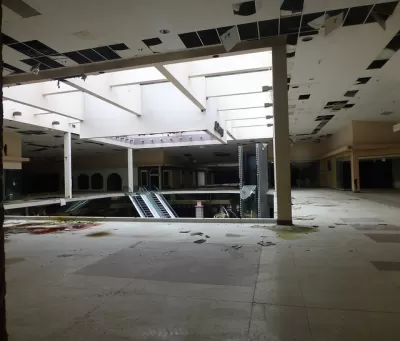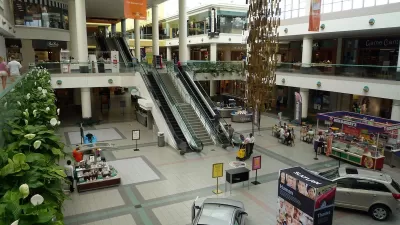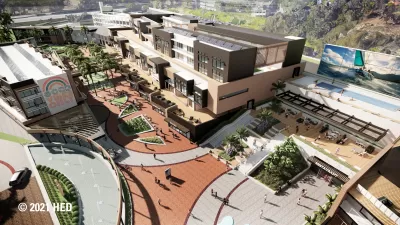Local leaders in Virginia are banking on mall redevelopment projects to revive their tax bases and create more mixed-use neighborhoods.

With traditional retail tax bases such as malls losing popularity, cities have to contend with the question of what to do with the buildings and spaces left behind. In Virginia, some city leaders are "grasping for ways to retrofit forgotten malls for urban living" in an effort to urbanize the suburbs and revitalize slumping neighborhoods. Writing in the Virginia Mercury, Wyatt Gordon reports on how cities and counties are responding to the shift in demand for commercial real estate.
Henrico County director of planning Joe Emerson says his county is working to make redevelopment of malls easier through "reworking our form-based code to put the flexibility in place for the private sector to come in and redevelop these indoor malls." To encourage redevelopment at the site of the former Regency Square Mall, "the county paid for infrastructure and roadway upgrades to incentivize the recycling of existing commercial spaces, the addition of residential units and the construction of a new sports facility to anchor the development." Emerson says "people still want that suburban lifestyle, but people also want mixed-use communities." Since malls are often situated in prime locations along busy commuter corridors, county officials hope that they will serve as ideal locations for multi-modal transit hubs.
In many cases, "redevelopment rather than retrofitting is the best way to deal with dead and dying malls. "The fantasy that a mall will be converted to a new use doesn’t often pencil out for developers," says Daniel Herriges, senior editor at Strong Towns. "These single-purpose buildings weren’t built to last 100 years in the first place so many older malls lack exterior windows and have structural problems too. It’s way cheaper to demolish the whole thing and start anew."
Herriges also warns against cosmetic changes that don't truly enhance livability or access. "Many of these retrofitted communities have the outward aesthetics of New Urbanism but are flawed in the way the community actually works and is structured. City planning offices often get shiny object syndrome — they focus all of their energy on one golden goose and ignore all the incremental changes they could make to increase prosperity across the whole locality."

Planetizen Federal Action Tracker
A weekly monitor of how Trump’s orders and actions are impacting planners and planning in America.

Map: Where Senate Republicans Want to Sell Your Public Lands
For public land advocates, the Senate Republicans’ proposal to sell millions of acres of public land in the West is “the biggest fight of their careers.”

Restaurant Patios Were a Pandemic Win — Why Were They so Hard to Keep?
Social distancing requirements and changes in travel patterns prompted cities to pilot new uses for street and sidewalk space. Then it got complicated.

Platform Pilsner: Vancouver Transit Agency Releases... a Beer?
TransLink will receive a portion of every sale of the four-pack.

Toronto Weighs Cheaper Transit, Parking Hikes for Major Events
Special event rates would take effect during large festivals, sports games and concerts to ‘discourage driving, manage congestion and free up space for transit.”

Berlin to Consider Car-Free Zone Larger Than Manhattan
The area bound by the 22-mile Ringbahn would still allow 12 uses of a private automobile per year per person, and several other exemptions.
Urban Design for Planners 1: Software Tools
This six-course series explores essential urban design concepts using open source software and equips planners with the tools they need to participate fully in the urban design process.
Planning for Universal Design
Learn the tools for implementing Universal Design in planning regulations.
Heyer Gruel & Associates PA
JM Goldson LLC
Custer County Colorado
City of Camden Redevelopment Agency
City of Astoria
Transportation Research & Education Center (TREC) at Portland State University
Camden Redevelopment Agency
City of Claremont
Municipality of Princeton (NJ)





























